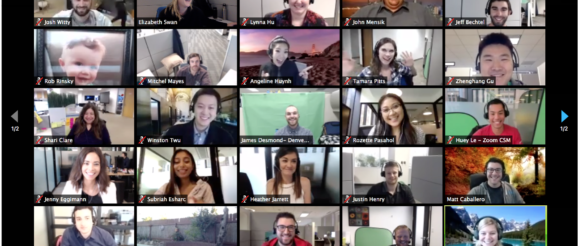First Impressions: Week 1 of Remote Teaching and Learning – Duke Learning Innovation

By Rebecca Vidra
Senior Lecturer & Director of Duke Environmental Leadership (DEL) Program
Classes resumed for our university last week, after two weeks of frantically working with faculty to transition their courses online. We held our collective breath as hundreds of Zoom meetings commenced throughout the day.
I checked into 14 of them, ensuring that my colleagues had things
set up and under control. I felt like I had won a golden ticket, really. I got
sneak peeks at GIS labs, discussions about energy policy, and lectures on
marine conservation leadership. If I had more time, I would have lingered to
learn more.
Professors welcomed their students back to class, acknowledged the
weirdness of this semester, pointed out resources for health care, and offered
to help students navigate challenges of finishing their work. I was struck by
the sincerity of their offers to help.
After we finished and began to breathe a collective sigh of
relief, I asked my colleagues to reflect on their first day back to school:
Everything went well yesterday. I did have one surprise: my 4 year old found his way into my office and showed up in the middle of the class. But to my surprise it wasn’t a total disaster. The students actually enjoyed the “interruption” and were happy to see him. I feel like the social distance is actually bringing people together. When we teach from home, we are inviting students to our home. And guess what? They will eventually run into our kids, pets, spouses, etc. And what I learned yesterday is – that’s ok if they do.
— Luana Lima, Time Series for Environmental Data Analysis
The first day went fairly smoothly. I guess the major
surprise was that there was no major snafu as the core technology all held up
to the untested demand. The students were entirely understanding and
appreciative of our efforts to make the shift to on-line as smooth as possible.
Our expectations weren’t very high and maybe we could have even been a bit more
ambitious, but in the end, we struck the right balance to kick things off.
— John Fay, GIS for Conservation Management
Class went great! The class is a small graduate seminar, and a student was presenting yesterday. We were all able to see each other’s faces while simultaneously following the powerpoint presentation. This was actually better than in a classroom, in which the class is facing the screen when a presentation is occurring. People asked questions throughout without any important technical glitches.
— Joel Meyer, Mechanisms of Environmental Toxicity
It went shockingly well— both classes. One class is large (88 students plus 5 TAs) and the other is smaller with discussion (12 students). No one reported any technical issues, and the chat function worked beautifully in the larger class for students to ask questions. I had more content related questions online than I normally do in class. In ENV 201, students have a little anxiety since we have a midterm coming up, but we practiced what they needed to do in Sakai to make sure they don’t have any problems. I am sure there will be, but students tend to be more adept at using technology than faculty. My discussion course was much better than I anticipated — as soon as people started talking it went smoothly. The Zoom recordings were available in about 90 minutes after class and they have already been posted. I am sure we will have problems moving forward, but the first jump was successful
— William Pan, Integration of Environmental Science and Policy
I think it went well yesterday (we’ll see how it goes tomorrow when I actually start lecturing with Marine Megafauna content). I was pleasantly surprised that Zoom didn’t crash yesterday. But, really, I was pleasantly surprised by how many students want to keep things as close to what we originally planned as possible, and in the same format. I think they are searching for consistency and routine now in this time of uncertainty.
— Meagan Dunphy-Daly, Marine Megafauna
Sure, there were some glitches along the way, but every class
managed to meet and restart the semester. Others have commented on online
teaching being a more intimate experience than
traditional classroom spaces, and this was confirmed by many of our faculty.
Overall, students AND faculty seemed relieved to go back to class, to restore a
little sense of normalcy in these unusual times.
